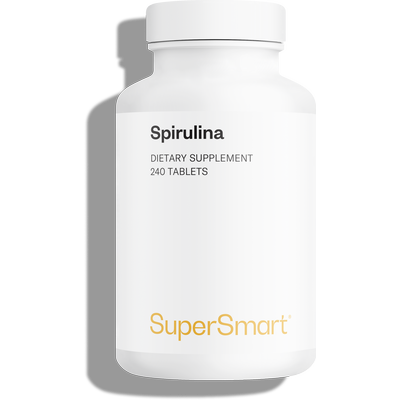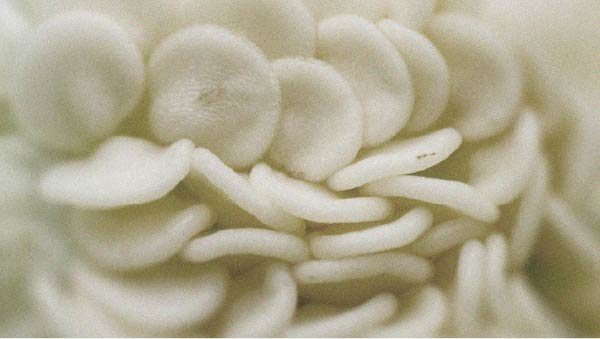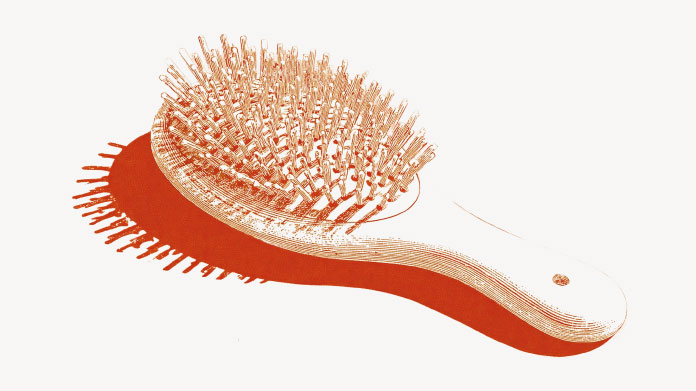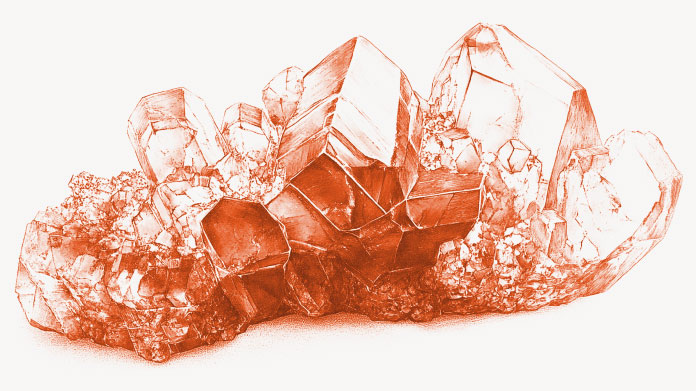Is spirulina good for the hair?
Spirulina, the famous blue-green micro-algae, is believed to have many benefits for health. Is it also good for the hair?
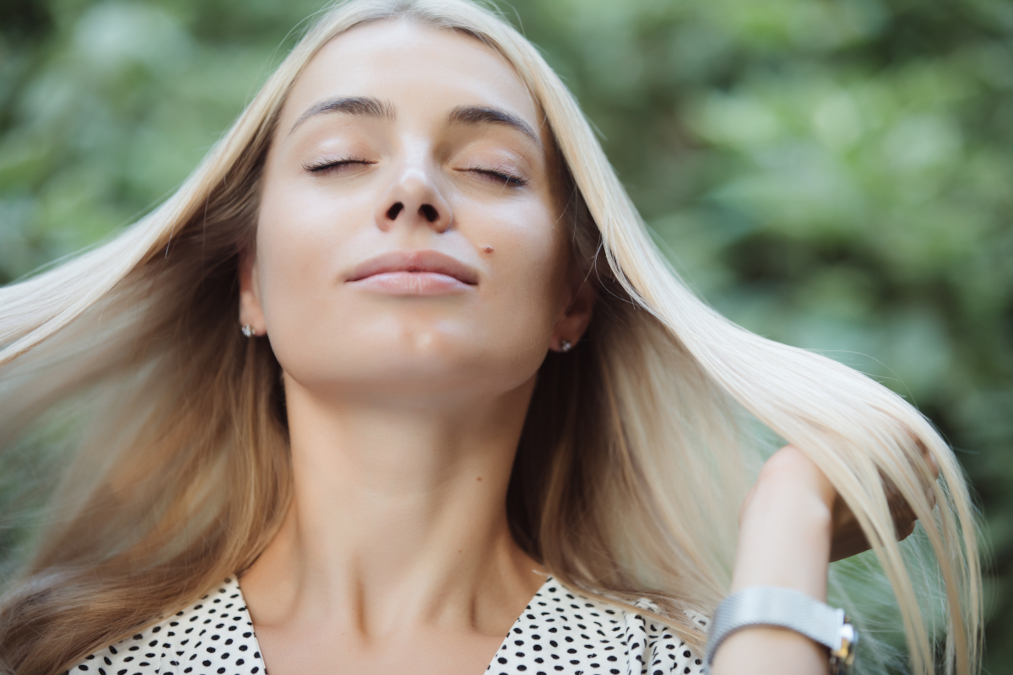
What exactly is spirulina?
Spirulina is a term used to refer to various species of microscopic, filamentous cyanobacteria. Its name comes from the spiral or helical nature of its filaments which can measure up to 0.5mm in length (1).
Cyanobacteria grow naturally in mineral-rich alkaline waters, at temperatures of 35°C-40°C. There are several thousand cyanobacteria, only some of which are edible.
Spirulina has a long history of use, dating as far back as the Aztec civilisation. It is still consumed in Mexico and Chad for its rich nutritional content.
When we talk about spirulina nowadays, it’s mostly in the context of dietary supplements (spirulina), mainly produced from Arthrospira platensis. These oxygenated photosynthetic bacteria are found across the world, in fresh an marine waters. Spirulina is also known today for its use by NASA as a dietary supplement for astronauts on space missions.
What health benefits does spirulina offer?
Spirulina is known for its high nutritional value, earning it the title ‘super-food’ and even ‘future food’. As a result of its rich nutrient content, it has many health benefits. Here are some of its properties.
Exceptionally rich in protein, vitamins and minerals
Firstly, spirulina is an excellent dietary source of protein and essential amino acids. It has an extraordinarily high protein content for a plant source, twice that of the best vegetable source, making it an excellent choice for muscle strength and endurance.
Spirulina also contains a high level of vitamins (A, B, C, D, E, K…) and a wide range of minerals (iron, calcium, magnesium, zinc, potassium, manganese…), micronutrients which are crucial for overall health.
Effects on immunity and energy
Its high zinc content, for example, contributes to its immunostimulant effect, while its richness in B vitamins boosts energy levels.
In addition, spirulina is notable in containing potentially immunomodulatory polysaccharides.
(perfect for feeling healthy and full of energy) and essential fatty acids (excellent for fighting inflammation and supporting brain function).
A veritable pro-immunity, anti-fatigue cocktail!
What are the benefits of spirulina for the hair?
While spirulina is primarily used for the properties mentioned above, various studies have been looking at its potential benefits for the health and appearance of the hair.
There has been a recent trend towards the use of spirulina-based supplements as ‘nutricosmetics’, to improve hair vigour and beauty.
Protein and keratin
Firstly, the protein in spirulina helps create keratin, the primary component of hair. An excellent aid, then, for strengthening the hair and supporting its growth.
Source of the ‘beauty vitamin’
One of the B vitamins in spirulina is biotin, also known as vitamin B8. This ‘beauty vitamin’ helps to maintain healthy hair (2).
Prevents iron deficiency and hair loss
A lack of iron is known to be a potential factor in hair loss(3). Fortunately, as mentioned above, spirulina is an excellent natural source of iron.
Hydration of the scalp
Spirulina’s fatty acids help to keep the skin, and therefore the scalp, well-hydrated. They also appear to reduce inflammation and help nourish the hair follicles (4).
Spirulina for combatting oxidative stress
External stressors (pollution, UV…) lead to increases in free radical production, which damages the health of our hair. The vitamin E in spirulina helps protect hair cells against this oxidative stress.
Conclusion: spirulina and the hair
All these various elements make spirulina (see Spirulina) an excellent aid for maintaining the health and appearance of your hair.
SUPERSMART ADVICE
References
- Karkos PD, Leong SC, Karkos CD, Sivaji N, Assimakopoulos DA. Spirulina in Clinical Practice : Evidence-Based Human Applications. 2010.
- Patel DP, Swink SM, Castelo-Soccio L. A Review of the Use of Biotin for Hair Loss. Skin Appendage Disord. 2017 Aug;3(3):166-169. doi: 10.1159/000462981. Epub 2017 Apr 27. PMID: 28879195; PMCID: PMC5582478.
- Park SY, Na SY, Kim JH, Cho S, Lee JH. Iron plays a certain role in patterned hair loss. J Korean Med Sci. 2013 Jun;28(6):934-8. doi: 10.3346/jkms.2013.28.6.934. Epub 2013 Jun 3. PMID: 23772161; PMCID: PMC3678013.
- Guo EL, Katta R. Diet and hair loss: effects of nutrient deficiency and supplement use. Dermatol Pract Concept. 2017 Jan 31;7(1):1-10. doi: 10.5826/dpc.0701a01. PMID: 28243487; PMCID: PMC5315033.
3 Hours
Quick delivery
Quick delivery
Caroline Saelens
8 Hours
High quality
In my experience the products will not disappoint you.
Fred Laan
3 Days
Super smart is really…super !
I would like to share my excellent experience with the company’s fast and efficient customer service. Even though I was calling from abroad, I was able to reach them relatively quickly. They responded to all my emails promptly and kept me consistently informed about the status of my order. When I needed assistance correcting a mistake I had made with my order, Ms. Lorie handled the issue immediately and very professionally. Thanks to their support and efficiency, I received my Super Smart products in Greece much faster than expected. Thank you very much for the outstanding service!
Kazanti Kleopatra
6 Days
Ordering and delivery is easy and fast
Ordering and delivery is easy and fast
Peter
8 Days
Simple and quick :-)
My order was delivered quickly, and I'm satisfied with the product! It was lot less fuss compared with some things I've ordered.
DEL Jacqueline
8 Days
Excellent quality products & customer…
Excellent quality products & customer service & care …thank you!
Giovanna Escalera
10 Days
great experience
Easy ordering, fast deliver, very professionally.
Natasa
13 Days
this company and its products are…
this company and its products are perfect: I have been their customer for three years , prices are reasonable for the high quality they offer , the products are of very good quality not just plainly "normal" , delivery is quite fast. we are very satisfied with them.
Gabriel Diacakis
14 Days
TOP service TOP products will buy again…
TOP service TOP products will buy again and again
PINOTTI Giorgio
16 Days
Trustworthy company with tested products
Trustworthy company with tested products
Trusted
20 Days
Efficiency and speed
Efficiency and speed
Cuccie
22 Days
GOOD BRAND IN FOOD COMPLEMENTS
GOOD BRAND IN FOOD COMPLEMENTS - SERIOUS WITH GOOD DOCUMENTS AND DETAILS SCIENTIST. AND SERIOUS HONNEST COMMERZIALISATION. I HAVE TRUST IN THEIR PRODUCTS.
FENOGLIO Guy
23 Days
Very good experience
Very good experience, the products arrived in time, in perfect condition and are good quality. Thank you.
GABI TIRCOCI
29 Days
very good expereince
very good expereince
Jelena Đaković
29 Days
Very good products.
Very good products.
Agnes BENDSAK
of experience
your money back
##montant## purchase


